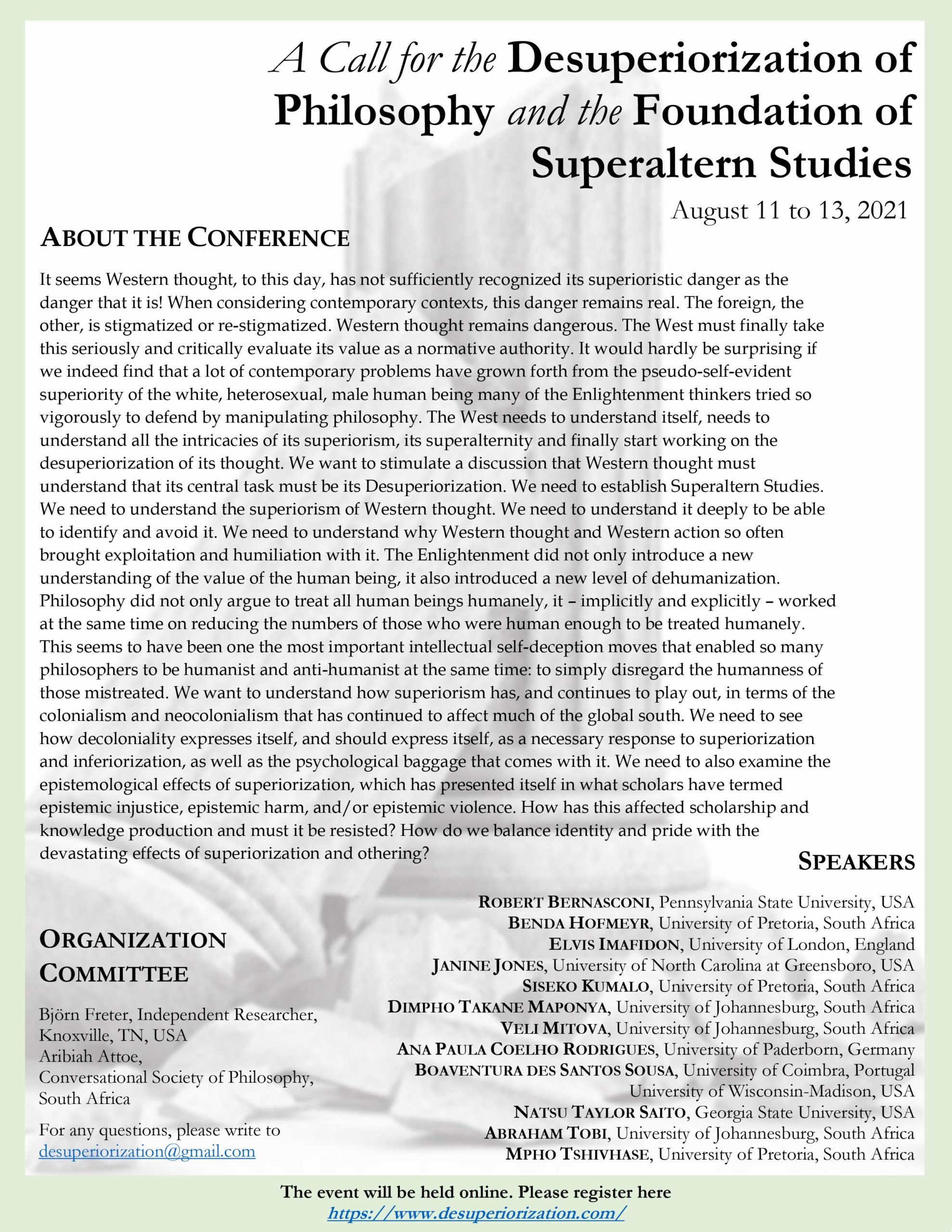-
August 11, 2021
7:50 AM - 1:00 PM
It seems Western thought, to this day, has not sufficiently recognized its superioristic danger as the danger that it is! When considering contemporary contexts, this danger remains real. The foreign, the other, is stigmatized or re-stigmatized. Western thought remains dangerous. The West must finally take this seriously and critically evaluate its value as a normative authority. It would hardly be surprising if we indeed find that a lot of contemporary problems have grown forth from the pseudo-self-evident superiority of the white, heterosexual, male human being many of the Enlightenment thinkers tried so vigorously to defend by manipulating philosophy. The West needs to understand itself, needs to understand all the intricacies of its superiorism, its superalternity and finally start working on the desuperiorization of its thought.
We want to stimulate a discussion that Western thought must understand that its central task must be its Desuperiorization. We need to establish Superaltern Studies. We need to understand the superiorism of Western thought. We need to understand it deeply to be able to identify and avoid it. We need to understand why Western thought and Western action so often brought exploitation and humiliation with it. The Enlightenment did not only introduce a new understanding of the value of the human being, it also introduced a new level of dehumanization. Philosophy did not only argue to treat all human beings humanely, it – implicitly and explicitly – worked at the same time on reducing the numbers of those who were human enough to be treated humanely. This seems to have been one of the most important intellectual self-deception moves that enabled so many philosophers to be humanist and anti-humanist at the same time: to simply disregard the humanness of those mistreated. We want to understand how superiorism has, and continues to play out, in terms of the colonialism and neocolonialism that has continued to affect much of the global south. We need to see how decoloniality expresses itself and should express itself, as a necessary response to superiorization and inferiorization, as well as the psychological baggage that comes with it. We need to also examine the epistemological effects of superiorization, which has presented itself in what scholars have termed epistemic injustice, epistemic harm, and/or epistemic violence.
How has this affected scholarship and knowledge production and must it be resisted?
How do we balance identity and pride with the devastating effects of superiorization and othering?
Registration is required for the conference @ www.desuperiorization.com.
Speakers
Robert Bernasconi, Pennsylvania State University, USA
Benda Hofmeyr, University of Pretoria, South Africa
Elvis Imafidon, University of London, England
Janine Jones, the University of North Carolina at Greensboro, USA
Siseko Kumalo, University of Pretoria, South Africa
Dimpho Takane Maponya, University of Johannesburg, South Africa
Veli Mitova, University of Johannesburg, South Africa
Ana Paula Coelho Rodrigues, University of Paderborn, Germany
Boaventura des Santos Sousa, University of Coimbra, Portugal, University of Wisconsin-Madison, USA
Natsu Taylor Saito, Georgia State University, USA
Abraham Tobi, University of Johannesburg, South Africa
Mpho Tshivhase, University of Pretoria, South Africa
Organization Committee
Björn Freter, Independent Researcher, Knoxville, TN, USA
Aribiah Attoe, Conversational Society of Philosophy, South Africa

